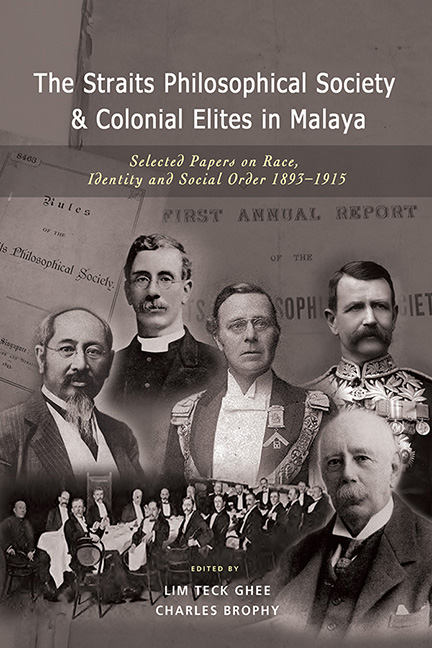 The Straits Philosophical Society and Colonial Elites in Malaya
The Straits Philosophical Society and Colonial Elites in Malaya Published online by Cambridge University Press: 09 January 2024
Editors’ Note
In one of several presentations that he made to the Society on education, Tan took up the issue of the modernization of Chinese education which he saw as central to the question of social reform amongst the Chinese. His essay is also notable for the attention it gives to the educational challenges faced by other communities and his criticism of British neglect. A notable intellectual and social activist, Tan, anticipating Furnivall’s much cited work on the emergence of the plural society almost fifty years later, was critical of the development of the colonial plural society in which “except as regards the strenuous pursuit of dollars, each leads a life of his own entirely indifferent to the existence or proximity of the other”. This was particularly true of the Europeans who, he argued, lived a separate social existence in the colony, governing only with regard to their own ideals and making only “feeble and spasmodic attempts” to understand and influence non-European populations.
Tan’s essay can be seen as an early pioneering call to the British for a greater focus on modernizing and reforming Malaya’s different communities. At the same time it is not surprising to find in his discussion on the Malays important discursive overlaps between Straits Chinese and European thought. The Malays were defined by Tan as characterized by a laziness induced by the tropical climate. Thus their “want of stamina and character is inherent, and if entirely left to itself the race will in all likelihood degenerate and die away in a not very distant future”. And whilst he would argue, alongside other members of the Society, that racial mixing was slowly improving the Malays, he also reasoned that as the “child of the soil” the Malays required special protection from the British, as well as the education of Malay women and the formation of model farms to teach them agriculture. These were themes which European members of the Society were also inclined to support (see Section 3).
To save this book to your Kindle, first ensure [email protected] is added to your Approved Personal Document E-mail List under your Personal Document Settings on the Manage Your Content and Devices page of your Amazon account. Then enter the ‘name’ part of your Kindle email address below. Find out more about saving to your Kindle.
Note you can select to save to either the @free.kindle.com or @kindle.com variations. ‘@free.kindle.com’ emails are free but can only be saved to your device when it is connected to wi-fi. ‘@kindle.com’ emails can be delivered even when you are not connected to wi-fi, but note that service fees apply.
Find out more about the Kindle Personal Document Service.
To save content items to your account, please confirm that you agree to abide by our usage policies. If this is the first time you use this feature, you will be asked to authorise Cambridge Core to connect with your account. Find out more about saving content to Dropbox.
To save content items to your account, please confirm that you agree to abide by our usage policies. If this is the first time you use this feature, you will be asked to authorise Cambridge Core to connect with your account. Find out more about saving content to Google Drive.